Digital Poster
Deuterium MRI
ISMRM & ISMRT Annual Meeting & Exhibition • 10-15 May 2025 • Honolulu, Hawai'i

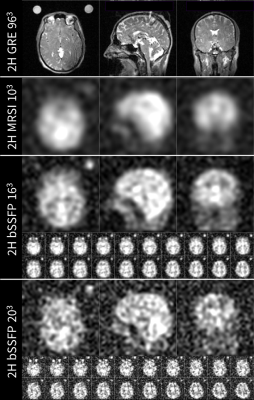 |
Computer Number: 33
2898. Improving
Image Resolution in Deuterium Metabolic Imaging with bSSFP for
Clinical Translation at 3T
R. Schulte, M. Vaeggemose, E. Hansen, C. Laustsen
GE HealthCare, Munich, Germany
Impact: DMI provides valuable clinical information, such
as tumour-treatment response, and might complement or even
partially substitute PET. The significant gain in spatial
resolution demonstrated here could be the missing link to
establish DMI clinically on 3T.
|
|
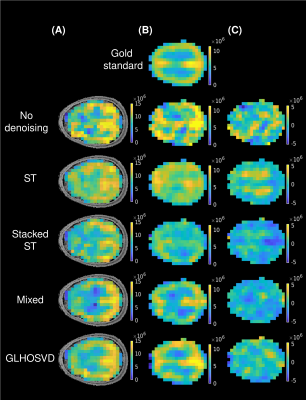 |
Computer Number: 34
2899. Comparison
of denoising methods for dynamic deuterium MRSI at 7T
A. Duguid, W. Bogner, F. Niess, L. Hingerl, V. Bader, S.
Frese, A. Osburg, M. Krššák, B. Lanz, B. Alves, C. Cudalbu,
B. Strasser
Medical University of Vienna, Vienna, Austria
Impact: Our work helps identify a denoising algorithm
for dynamic 2H-MRSI
that achieves high denoising performance while preserving
regional variations. The achieved reductions in metabolite
concentration uncertainty may enable high-resolution,
whole-brain dynamic 2H-MRSI,
to investigate oxidative and non-oxidative human brain
metabolism.
|
|
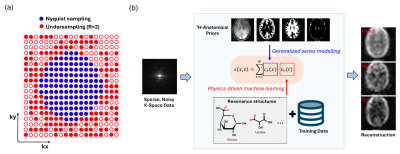 |
Computer Number: 35
2900. Fast
High-Resolution Deuterium MR Spectroscopic Imaging Integrating
Low-Rank and Generalized Series Modelling
Y. Li, X. Li, R. Guo, Z. Xu, Y. Zhao, W. Jin, H. Wiesner,
X-H Zhu, Z-P Liang, W. Chen
University of Illinois at Urbana-Champaign, Urbana, United States
Impact: The proposed method improves reliability and
resolution for imaging human brain glucose metabolism. The
method would prove useful for study of metabolic
reprogramming in both healthy and diseased states,
particularly, for mapping brain tumor Warburg effects and
assessing intra-tumor heterogeneity.
|
|
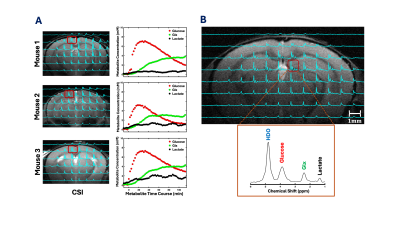 |
Computer Number: 36
2901. High
Resolution Dynamic Deuterium MRS Imaging of Cerebral Glucose
Metabolism in Mouse Brain at Ultrahigh Field of 16.4T
A. Monsef, X-H Zhu, C. Zou, T. Wang, K. Haney, Y. Li, Z-P
Liang, W. Chen
Center for Magnetic Resonance Research, University of Minnesota, Minneapolis, United States
Impact: This work demonstrates the capability of
high-resolution 2H-MRSI for mapping deuterated metabolites
and dynamics in the mouse brain with excellent sensitivity.
It highlights the potential of studying cerebral glucose
metabolism in various mouse models of genetic or other
diseases.
|
|
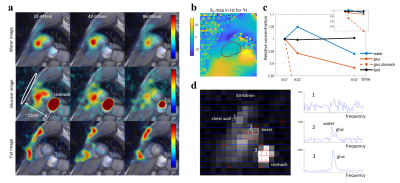 |
Computer Number: 37
2902. Metabolic
Myocardial Mapping with Multi-echo bSSFP: Pilot study in humans
on a clinical 3T MRI scanner
J. Xiang, R. de Graaf, H. DeFeyter, M. Thomas, L.
Baldassarre, J. Kwan, A. Sinusas, E. Miller, D. Peters
Yale University, New Haven, United States
Impact: The first study of human cardiac DMI at 3T was
performed using multi-echo bSSFP, showing capability to
isolate deuterated water and glucose in a 10min scan, and
advantages over multi-echo GRE and conventional magnetic
resonance spectroscopic imaging (MRSI).
|
|
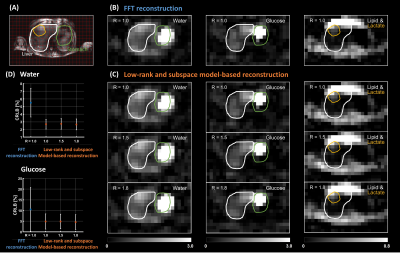 |
Computer Number: 38
2903. Accelerated
Deuterium Metabolic Imaging of Liver Metastasis at 7T Using
Low-Rank and Subspace Reconstruction with Retrospective
Undersampling

K. M. Nam, L. S. Ho, A. Braat, J. Prompers, A. Bhogal
UMC Utrecht, Utrecht, Netherlands
Impact: This study enables faster DMI of the abdomen by
combining Hamming weighted acquisition with low-rank and
subspace reconstruction. The results pave the way for
advanced metabolic imaging applications, potentially
enhancing liver cancer assessment and treatment planning in
clinical settings.
|
|
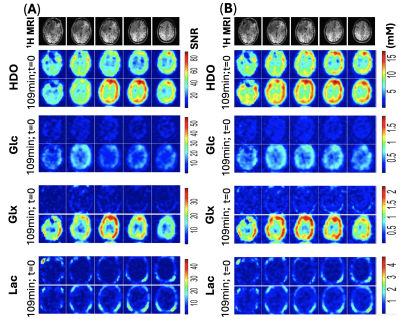 |
Computer Number: 39
2904. Exploration
of bSSFP-CSI for High-resolution Deuterium Metabolic Imaging
(DMI) in the human brain at 7T
H. Wiesner, E. Montrazi, X. Li, L. Frydman, X-H Zhu, W. Chen
CMRR, University of Minnesota Medical School, Minneapolis, United States
Impact:
We have explored the bSSFP-CSI approach for human brain DMI at 7T. Initial observations show promise for achieving high-quality and high-resolution DMI to map low-concentration metabolites including lactate. More rigorous quantification and validation are needed for potential translational applications. |
|
 |
Computer Number: 40
2905. Assessment
of the feasibility and optimal dosing of human abdominal
deuterium metabolic imaging (DMI) at 3T

P. Wodtke, M. McLean, I. Horvath-Menih, J. Birchall, M.
Zamora-Morales, A. Grimmer, E. Latimer, M. Wylot, R.
Schulte, F. Gallagher
University of Cambridge, Cambridge, United Kingdom
Impact: This study shows the feasibility of human
abdominal DMI at clinical field strengths. It demonstrates
signal timecourses within the healthy kidney and liver as a
reference for future clinical studies. In addition a dose
reduction lowers the DMI scan costs.
|
|
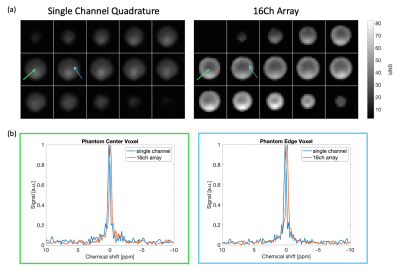 |
Computer Number: 41
2906. An
Integrated 1H/2H Multichannel Head Coil for Improved Deuterium
Metabolic Imaging
A. Bennett Haller, A. Autry, M. Vaeggemose, L. Carvajal, C.
Wang, H. Liang, Y. Zhao, C. Laustsen, Y. Li, D. Wilson, D.
Xu, J. Gordon
University of California, San Francisco, San Francisco, United States
Impact: Improved
SNR in 3T DMI with an integrated 1H/2H
multichannel array coil has the potential to greatly improve
the detection of impaired glucose metabolism and regional
differences in brain disease diagnosis.
|
|
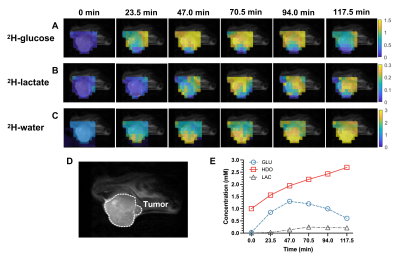 |
Computer Number: 42
2907. Deuterium
MRI for characterizations of glucose metabolism in subcutaneous
bladder cancer models.
B. Weng, G. Yang, L. Kong, Z. Wen, Y. Guo, H. Wang
The First Affiliated Hospital, Sun Yat-Sen University, Guangzhou, China
Impact: Our study
established that deuterium MRI holds promise to depict
the metabolism of bladder cancer. Deuterium MRI is a safe,
non-radioactive, and effective imaging
modality to diagnosis bladder cancer and guide clinical
treatment in the future.
|
|
 |
Computer Number: 43
2908. Kinetic
Modeling of Cerebral Glucose Metabolism to Quantify Metabolic
Rates Using High-resolution 2H-MRSI
C. Zou, A. Monsef, G. Zhang, X-H Zhu, W. Chen
University of Minnesota, Minneapolis, United States
Impact: Reliable
and quantitative assessment of cerebral metabolic rates of
glucose metabolism along non-oxidative and oxidative
pathways is critical for studying brain energy metabolism
and metabolic reprogramming. The proposed method has the
potential for broad applications in various neurological
diseases.
|
|
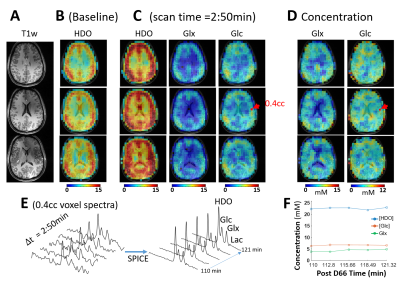 |
Computer Number: 44
2909. High
spatial-temporal resolution dynamic deuterium (2H) MRS imaging
(DMRSI) with 3D-Checkerboard-Grappa SPICE
X. Li, Y. Li, H. Wiesner, R. Guo, Z. Xu, X-H Zhu, Z-P Liang,
W. Chen
University of Minnesota, Minneapolis, United States
Impact: The proposed parallel DMRSI approach enables
quantitative assessment of deuterated glucose metabolite
concentrations and dynamics with higher spatiotemporal
resolution throughout the human brain, making it possible to
determine oxidative and non-oxidative glucose metabolic
rates with improved resolution and tissue contrasts.
|
|
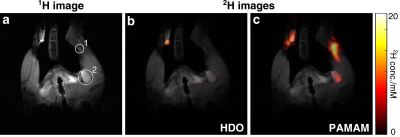 |
Computer Number: 45
2910. Quantitative
Lymphatic Imaging Using Deuterated Particle Imaging
L. Fries, E. Montrazi, H. Allouche-Arnon, F. Opazo, A.
Bar-Shir, L. Frydman, S. Glöggler
Max Planck Institute for Multidisciplinary Sciences, Göttingen, Germany
Impact:
This innovative technique enhances research in inflammation and immune response by providing quantitative insights into physiological processes. It could advance our understanding of lymph node activity in vivo through deuterium MRI combined with deuterated nano-polymers in an inflammatory rodent model. |
|
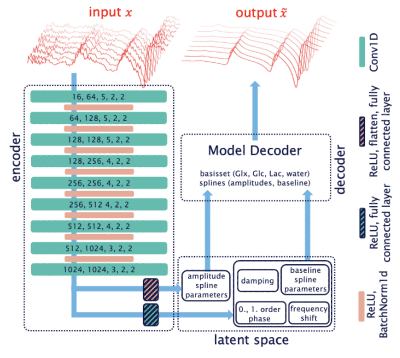 |
Computer Number: 46
2911. Physics-Informed
Deep Autoencoder for Dynamic Fitting of Deuterium Metabolic
Imaging Data
A. Osburg, W. Bogner, A. Shamaei, B. Strasser, F. Niess, L.
Hingerl, A. Duguid, V. Bader, S. Frese, M. Krssak, S. Motyka
Medical University of Vienna, Vienna, Austria
Impact: DL-based dynamic fitting of DMI data allows
ultra-fast quantification of metabolite concentration
time-courses in good agreement with LCModel fits of low-rank
denoised data. The proposed method is more robust against
uncertainties caused by low signal-to-noise ratio (SNR) than
LCModel.
|
|
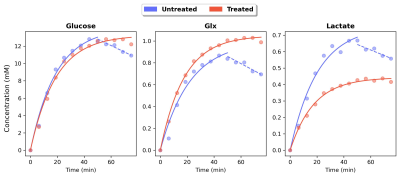 |
Computer Number: 47
2912. Effects
of nicotinamide riboside supplementation on glucose metabolism
and lipid homeostasis in healthy mice

A. Swain, N. D. Soni, S. Khokhar, H. Juul, P. Jacobs, R.
P. R. Nanga, M. Haris, R. Reddy
University of Pennsylvania, Philadelphia, United States
Impact: Nicotinamide
riboside has potential in improving cerebral glucose
metabolism and lipid integrity as assessed by
lipid-sensitive MRI and 2H-MR
spectroscopy, necessitating further exploration of NR and
other NAD+ precursors
both clinically and in aging-related diseases using these
methods.
|
|
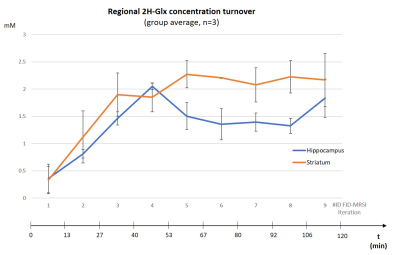 |
Computer Number: 48
2913. Dynamic
mapping of Glc oxidative metabolism in rats with indirect
1H-FID-MRSI deuterium detection at 9.4T
A. Siviglia, B. Alves, F. Niess, Z. Starčuk Jr., W. Bogner,
B. Strasser, C. Cudalbu, B. Lanz
CIBM Center for Biomedical Imaging , Lausanne, Switzerland
Impact: Our work shows the potential of recently
developed preclinical 1H-FID-MRSI
protocols to track 2H
labelling in downstream glucose metabolism in a quantitative
way, with sufficient SNR to characterise the time course of
glutamate-glutamine turnover with regional specificity.
|
The International Society for Magnetic Resonance in Medicine is accredited by the Accreditation Council for Continuing Medical Education to provide continuing medical education for physicians.